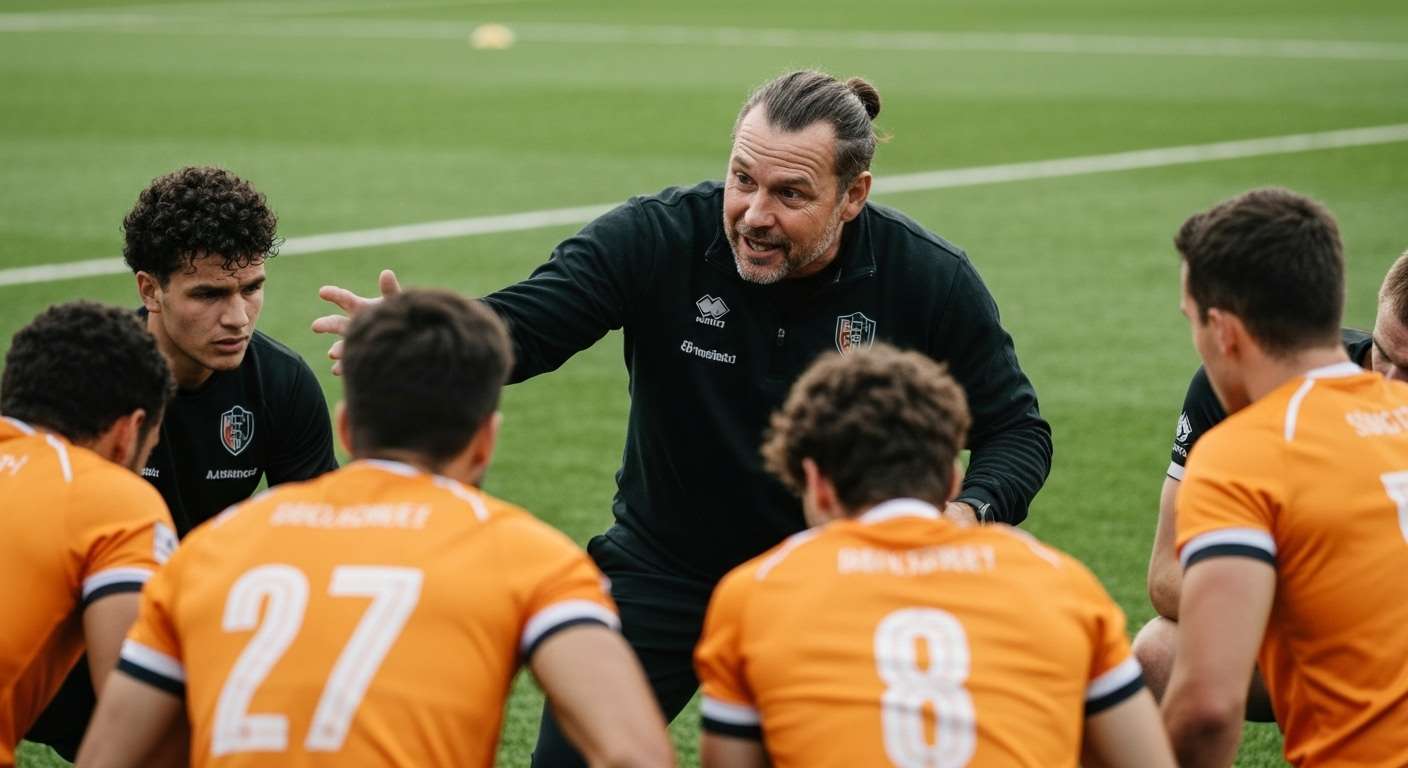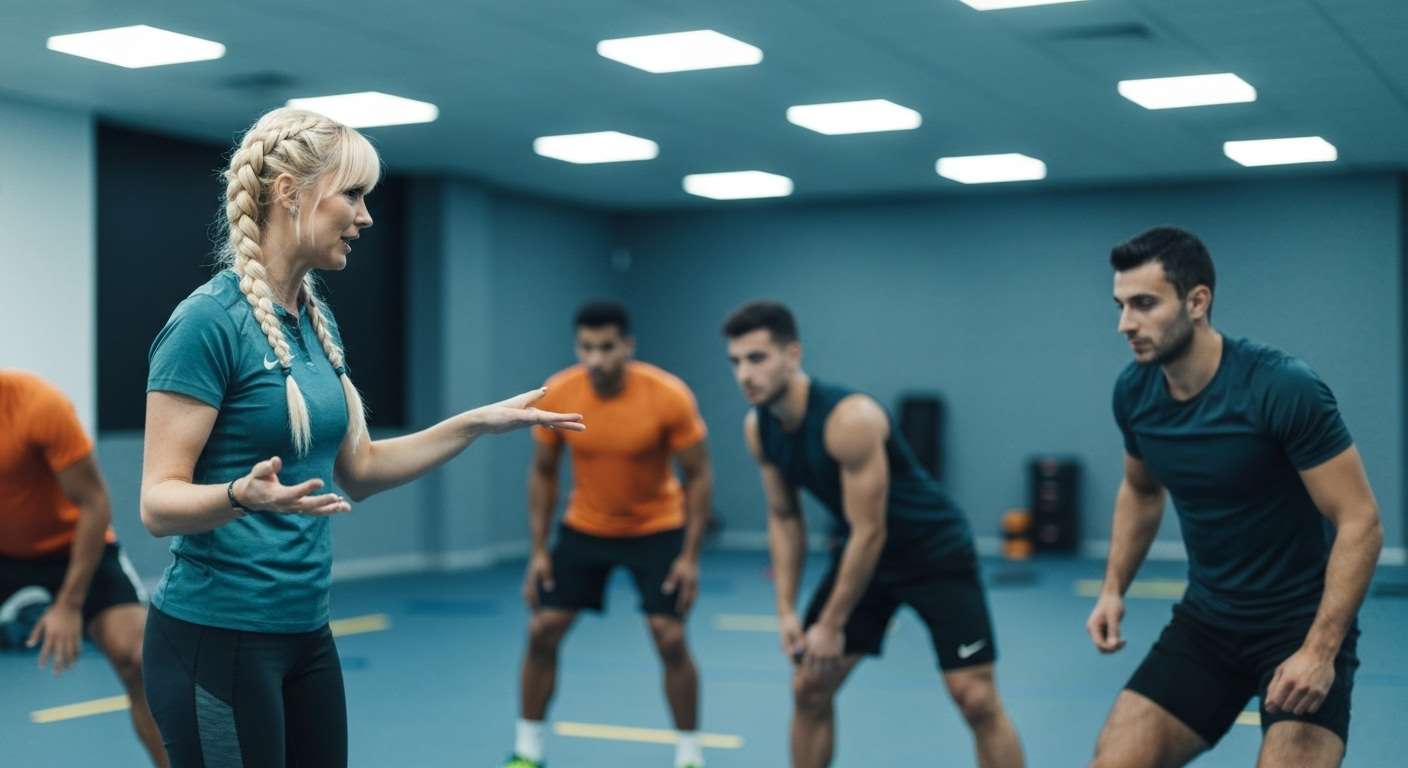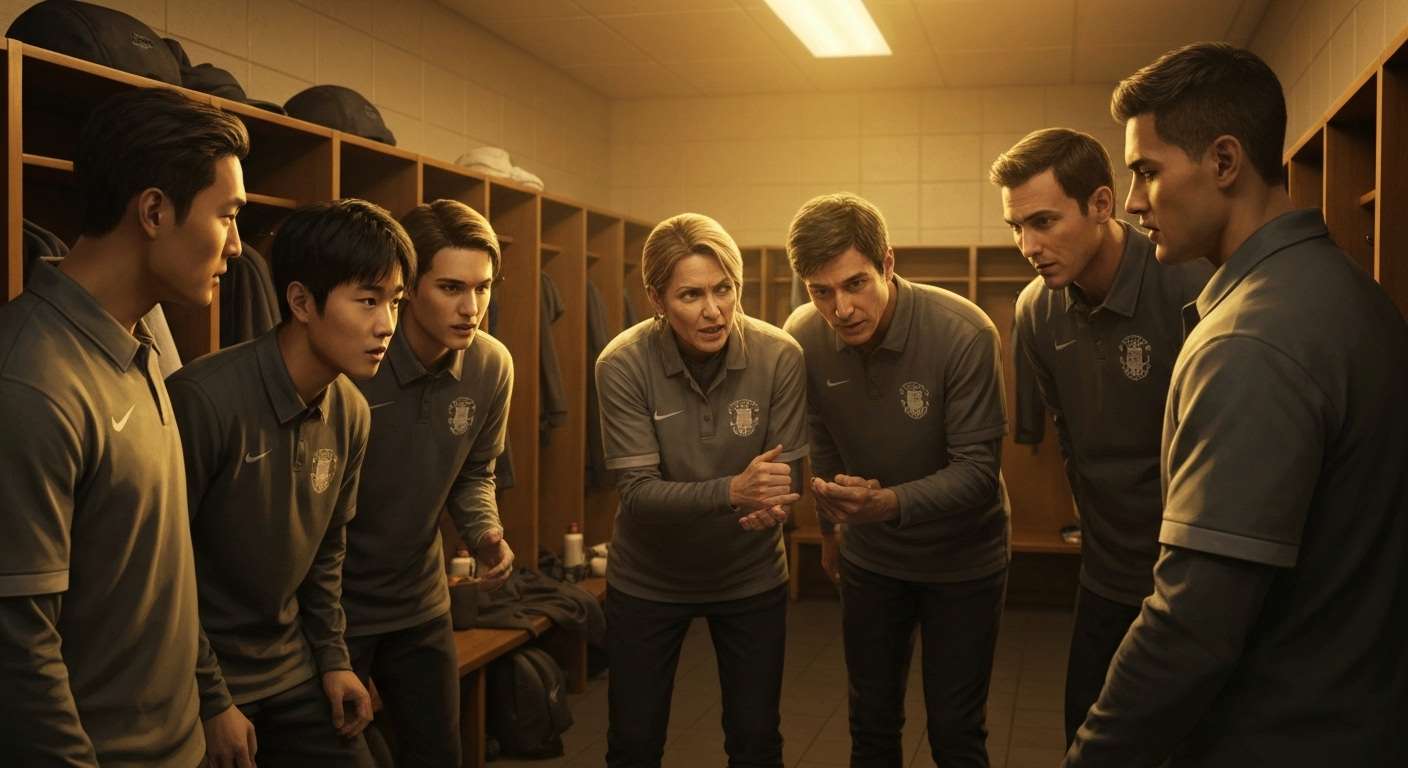Table of Contents
- Key Highlights
- Introduction
- The Importance of Psychological Skills in Modern Sports
- Core Psychological Skills Every Athlete Should Develop
- The Nine Mental Skills of Successful Athletes
- Methods and Techniques Used in Psychological Skills Training
- Developing Mental Toughness Through Psychological Training
- Integrating Mental Skills into Daily Athletic Training
- Coaches’ Role in Implementing Psychological Skills Training
- Special Considerations for Endurance and Individual Sport Athletes
- Psychological Skills for Team Sports and Group Dynamics
- Research Evidence Supporting Psychological Skills Training
- Conclusion
- Frequently Asked Questions
Key Highlights
- Psychological skills training (PST) is a crucial component for achieving peak performance in modern sports.
- Developing mental toughness through targeted training helps athletes manage pressure and perform consistently.
- Key skills include goal setting, visualisation, and positive self-talk, which are integral to an athlete's mental preparation.
- Effective stress management and emotional regulation techniques allow athletes to control anxiety and maintain focus.
- PST is not an innate talent but a set of teachable skills that can be learned and honed with practice.
- The integration of mental and physical training creates a balanced approach to reaching elite levels.
Introduction
As sports get more competitive, the gap in physical, technical, and strategic ability among elite athletes is getting smaller. Now, people pay more attention to the mental side of the game. The thing that separates good players from great ones is often how they think and react. Psychological skills training, or PST, is a way to work on mental skills to help someone do better and enjoy sports more. Over time, experts in sports psychology have shown that psychological skills are not only for a few top athletes, but everyone can learn them. These skills are important for anyone who really wants to compete.
The Importance of Psychological Skills in Modern Sports
 In sports today, the drive to reach peak performance needs more than strong bodies. Staying strong in the mind is key when things get tough. Psychological skills training helps athletes unlock their full talent and perform well again and again.
In sports today, the drive to reach peak performance needs more than strong bodies. Staying strong in the mind is key when things get tough. Psychological skills training helps athletes unlock their full talent and perform well again and again.
This kind of training is important and is part of every athlete's growth . By using sport psychology and working on psychological skills, athletes can handle the big pressure in games. This is how they turn their chances into wins.
The Evolving Role of Mental Training for Athletes
The field of mental training for athletes has changed a lot over the years. It started in the United States during the late 1970s. At that time , people thought psychological skills were something you were born with. You either had them or you did not. This idea stopped the growth of mental coaching, even though the first people in this area saw how important it could be.
Later, research and real-world practice showed these skills can be taught and learned. This new way of thinking has made mental training a key part of how elite performers grow. Athletes now use it to build a positive attitude, manage their degree of anxiety, and develop the strength they need to do well at the top level.
In the end, psychological training helps improve your performance. It gives athletes ways to stay in control of their thoughts, feelings, and focus. With these tools, they can keep calm when they feel pressure, practice skills well, and change their plans when competitions do not go the way they expect.
Benefits of Psychological Skills for Performance Outcomes
Taking part in psychological skills training can give athletes many clear benefits. It can help their performance in big ways. Athletes who use mental skills often get better at keeping their mind on the game. They block out things that might distract them. This strong focus helps them do their best. Peak performance needs this level of focus.
Another good thing is building strong self-belief and finding inner motivation. When athletes use good mental skills, they learn how to chew over their thoughts and set real goals. Keeping control of what goes on inside helps grow trust in their own power to do well. This drive from inside helps them keep going and push themselves. It is important for them to do well all the time at a high level.
Also, psychological skills training helps athletes control their feelings better and deal with tough times. They are able to handle worries, fix mistakes, and stay cool when the pressure is high. Using these mental skills not only helps them play better, but it also makes their sport more fun and satisfying for them.
Mental Skills Versus Physical Training: Understanding the Balance
Think of top athletic performance like a wheel. People once thought mental training was just another spoke, along with things like physical training and tactics. But, today in sports psychology, mental skills are seen as the center of the wheel. That is because every move or choice an athlete makes starts in the brain.
So, your mind is not on the outside. It is that main part of performance. Physical training gets the body ready, but mental training helps the mind control it well. You need both to do well in any sport, whether it is football, gymnastics, or one of the other different sports out there.
If you want a wheel that spins just right, you must focus on every part. The mind is at the center, giving balance and support to everything else. The core parts are:
- Physiology and conditioning
- Technical skills
- Tactics and strategy
- Nutrition
- Mental skills
- Recovery and physiotherapy
Core Psychological Skills Every Athlete Should Develop
 If you want to be strong in your mind, you need to build some key psychological skills. These skills are important for any athlete who wants to do well all the time and have strong mental toughness. Some of the main things to work on are goal setting, self-confidence, and emotional regulation.
If you want to be strong in your mind, you need to build some key psychological skills. These skills are important for any athlete who wants to do well all the time and have strong mental toughness. Some of the main things to work on are goal setting, self-confidence, and emotional regulation.
When you get better at these psychological skills, you start to control your own mind more. You do not let your mind take over you. With these tools, you improve your coping skills and emotional intelligence. You set up a good base for your sports career. The next parts will look at these important skills more closely.
Goal Setting and Motivation
Effective goal setting is one of the most important parts of sport psychology. It helps people stay focused and keeps motivation strong. One way to do this is to set clear, short-term goals. When you do this, you pay attention to helpful things during practice and games. You don't let your thoughts drift away from what you need to do.
For example, think about a rower. They might pick a small skill to work on for just 20 strokes. When you split a race or training session into these smaller parts, you keep your mind busy and know what to do next. This way, you build speed and stay tuned in to the job, which can help you do your best.
This way of goal setting helps your own drive from inside. If you keep reaching these small, clear goals, you start to feel good about what you can do. This makes you believe in yourself. This is better than always depending on things like prizes from outside. When your drive comes from inside, you are more likely to stick with it for a long time .
The right goal setting in sport psychology helps you grow your intrinsic motivation. It keeps you moving, focused, and working towards what you want.
Self-Confidence and Self-Belief
Self-confidence is an important part of mental toughness, and it helps set elite athletes apart from others. This is the strong belief that you have in your own ability to do well, and it comes a lot from what you say to yourself in your mind. Building a positive attitude by practicing often can really make your self-belief stronger.
What you say to yourself in tough times, like when you are losing in a game, has a big effect on how you do. Positive self-talk makes you take action and keep going. Negative self-talk can make you stop trying and feel like giving up.
Coaches and athletes can help build self-confidence by using some methods that work. These ways can make a space where people can start to really believe in what they can do:
- Promoting positive and encouraging self-talk.
- Acting as a role model for confidence.
- Giving genuine verbal praise and persuasion.
- Focusing on past successes to reinforce capability.
Emotional Regulation and Coping Mechanisms
The way you handle your emotions can make the difference between doing well and being great. If you know how to control your feelings, you can stay in a good state that helps you compete well. This is true even when you face the big and tough moments. Being able to do this is part of having emotional intelligence and good stress management.
Athletes face many times where they feel a high degree of anxiety. It can start with feeling nervous before the game or from worrying about mistakes. If they don't use strong coping skills, these feelings can hurt how well they do. Psychological training helps you notice these emotions. It also teaches you to deal with them in a positive way and not just react without thinking.
It is true that psychological training can help you handle performance anxiety. By learning methods such as taking slow breaths, using mindfulness, or changing the way you think about problems, you can lessen your stress both in your body and your mind. This helps you keep calm, make smart choices, and do your best when you need it most.
The Nine Mental Skills of Successful Athletes
![]() Beyond the basic abilities, there is a set of nine mental skills that top athletes use for steady success. These mental skills help people in sports handle tough situations in the right way. Elite performers work on these mental skills step by step. This helps them get ahead of the competition.
Beyond the basic abilities, there is a set of nine mental skills that top athletes use for steady success. These mental skills help people in sports handle tough situations in the right way. Elite performers work on these mental skills step by step. This helps them get ahead of the competition.
The nine mental skills include key things like attitude and learning how to control your feelings. They also cover advanced mental skills like using mental imagery. When you use these mental skills in your own mental preparation, it helps make your mind stronger and ready to do well. The next sections go into detail about some of these mental skills.
Attitude and Mental Preparation
Your attitude is the base for all other mental skills. Having a positive attitude helps you see challenges as chances to grow. You will not see them as problems you cannot beat. This way of thinking is a key part of mental preparation. It also stands out in psychological skills training.
Mental preparation means you work on your thoughts and feelings before you perform. The goal is to take charge of what is going on inside you so you will be ready to do your best. When you do this, you build your confidence. You also lower the chances that pressure will get to you.
Keeping a positive attitude every day is one of the most key ways to build mental toughness. It shapes how you look at events, the way you talk to yourself, and how you react when things do not go as planned. If you choose to have a positive view, it will help you keep going through the highs and lows of sport. This is how you build up the resilience you need by using your mental skills and taking help from psychological skills training.
Physical Arousal Control
Reaching peak performance means you need to find the best balance of both body and mind energy. If you are too calm, you might not focus or give your best. But if you have too much energy, you can get tense muscles and make bad choices. Sports psychology helps people control how stirred up they feel, both in their bodies and minds.
Being able to manage your own body is key when it comes to handling your degree of anxiety. When you feel on edge, things like a fast heartbeat, quick breathing, or sweaty hands can show you that you are wound up. If you do not get a hold of these feelings, they can hurt how well you do at a task.
Sports psychology teaches you ways to work on your mental training. This might include deep breathing, slowly relaxing your muscles, or using centering exercises. These tools help you bring your arousal down if you feel too worried or bring it up when you need a boost. When you use these skills, you can get into your best state for doing well, even when there is a lot of pressure.
Visualisation and Imagery Techniques
Visualisation, also called mental imagery, is a strong mental training method that many elite performers in sports use. You use your mind to create clear and detailed pictures. The practice covers more than just sight. You use sound, touch, and emotion. The goal is to make the mental picture feel real, like you are performing for real.
This mental rehearsal is not just daydreaming. Research has found that visualisation lights up the same neural pathways in the brain used in actual physical performance. That means you can train your mind and body for success , even if you are not on the field or court.
This technique is basic for psychological skills training. There are many benefits when you use mental imagery often. Regular visualisation can help with the following:
- Building and improving technical skills.
- Boosting self-confidence and lowering anxiety.
- Making and practicing competition plans.
- Getting your body ready to use skills well when feeling pressure.
Methods and Techniques Used in Psychological Skills Training
 Psychological skills training uses many proven ways to help athletes get better at their mental game. The goal of these psychological skills is to give you practical tools you can pick up and use both in training and when you compete. Two of the best ways to do this are by using cognitive behavioural strategies and mindfulness practices.
Psychological skills training uses many proven ways to help athletes get better at their mental game. The goal of these psychological skills is to give you practical tools you can pick up and use both in training and when you compete. Two of the best ways to do this are by using cognitive behavioural strategies and mindfulness practices.
Today, there is also new technology, like biofeedback and neurofeedback. These tools give you real-time data, so you can better see and control your body and brain responses. Using these methods can help you perform even better when under pressure.
Cognitive Behavioural Strategies
Cognitive behavioural strategies are a fundamental part of psychological skills training, focusing on the powerful link between your thoughts, feelings, and actions. One of the most effective techniques is cognitive restructuring, which involves identifying, challenging, and reframing negative or unhelpful thoughts.
Many of us react to difficult situations with automatic negative thinking that can spiral into anxiety and self-doubt. Cognitive restructuring teaches you to interrupt this pattern and consciously choose a more constructive perspective. This skill is vital for developing effective coping skills and for stress management.
By changing your thoughts, you can change how you feel and, ultimately, how you perform. For example, you can learn to reframe a negative thought into a more empowering one. This simple shift can have a profound impact on your confidence and resilience.
| Negative Automatic Thought | Reframe |
|---|---|
| "I can't believe I made that mistake. I'm going to lose." | "Mistakes happen. I'll stay focused on the next play and execute it well." |
| "I'm too nervous to perform well." | "These nerves mean I'm ready. I can use this energy to fuel my performance." |
Mindfulness and Meditation Practices
Mindfulness and meditation are now being used a lot in psychological skills training. Mindfulness means you pay attention to the present moment and notice your thoughts, feelings, and how your body feels. You do this without judging what you find. The idea is to look at your own state with curiosity and accept it.
This is an important part of things like the Mindfulness-Acceptance-Commitment (MAC) model. The MAC model helps athletes get better at what they do by accepting what happens inside them instead of fighting it. If you accept thoughts that are negative or feelings that make you nervous, they have less control over you. This helps you focus and makes the experience more fun.
When you meditate often, you get better at being mindful. Meditation helps you handle your emotions better. It gives you time between a feeling and what you do because of it. This get you to deal with things more clearly and stay calm. Meditation is a great way for athletes to work on their psychological skills and improve their mental strength.
Biofeedback and Neurofeedback Tools
Modern sports psychology now uses technology to help athletes train in a more exact way. Tools like biofeedback and neurofeedback give you real-time facts about your body and brain activity. With this, you have the chance to see and learn how to control it.
In biofeedback training, sensors watch things like your heart rate, muscle tension, and skin warmth. When you see this readout, you can learn different methods to handle these reactions. This is good for people who have a high degree of anxiety. Neurofeedback is almost the same. It checks your brainwaves to help you boost focus and clear thinking.
Using these tools in mental training shows you a better picture of how your mind and body link up. Adding this new way to your training can help you in many areas:
- Improved skill to control stress and anxiety.
- Sharper focus and stronger concentration.
- Easier handling of your body's excitement levels.
- Quicker bounce back after tough mental or body workouts.
Developing Mental Toughness Through Psychological Training
 Mental toughness is not something you are just born with. You can learn and grow it as a skill. It comes from working on your psychological skills. You need mental toughness to perform well every time, no matter what is happening around you. The way to get there is to build up your resilience, feel calm when under pressure, and keep great focus.
Mental toughness is not something you are just born with. You can learn and grow it as a skill. It comes from working on your psychological skills. You need mental toughness to perform well every time, no matter what is happening around you. The way to get there is to build up your resilience, feel calm when under pressure, and keep great focus.
A set programme for psychological skills training is what helps you grow these mental skills. When you train your mind step by step, you get better at handling tough moments. This sets you up for peak performance and helps you unlock what you can really do.
Building Resilience Against Setbacks
Resilience is a big part of mental toughness. It means you can get back on your feet after hard times, setbacks, or when things do not go your way. For elite athletes, setbacks will happen along the way. The thing that sets the best apart is not if they fall , but how quick and how well they get up again.
Psychological skills training helps you build this resilience. It shows you how to see failure not as something that shows your worth, but as something you the learn from. This change in how you think helps you find lessons in your mistakes. It makes it easier to come back stronger and not let your confidence fall .
When you use things like positive self-talk and know how to handle your feelings, you the deal with the tough days better. This mental toughness lets you keep your drive and work toward your goals, even when the road is hard. These psychological skills are what help elite athletes stay strong when it counts the most.
Embracing Pressure and Performing Under Stress
A main part of mental toughness is being great at handling stress. It's not just about coping, but about doing well when under pressure. Many athletes find it hard to stay calm, but the people with mental toughness use stress as a chance to show what they can do. Good stress management is needed if you want to do your best every time .
Psychological training gives you ways to change how you think about stress. Instead of seeing tough moments as problems, you learn to look at them as good challenges. Thinking this way helps you keep cool and do your best when it matters.
Here are some things you can do to help you perform when stressed:
- Use routines before you play to help you feel in control.
- Keep your mind on what you are doing, not just on the end result.
- Use relaxation methods so your body feels calm.
- Talk to yourself in a good way to help build confidence.
Use these tips if you want to work on your mental toughness and stress management. They can make you better in tough times and help you stand out.
Sustaining Focus Over Time
Sustaining your focus during the whole time of a competition is not easy. This is a big test of mental toughness. Elite athletes are really good at staying focused. They know how to block out both inside and outside distractions. They keep their mind on the task and stay in the moment.
Psychological skills training gives you ways to make your focus better. Things like mindfulness meditation help you to train your mind. You notice faster when your thoughts start to drift and you bring them back to what you need to do. Over time , using this skill often makes it stronger, just like a muscle that gets worked out.
Also, if you learn to set goals that focus on what you need to do right now, it is easier to stay on task. Breaking your performance into small steps helps you not feel overwhelmed. When you get good at keeping your focus, it can give you a big edge in the competitive world.
Integrating Mental Skills into Daily Athletic Training
 For psychological skills training to work, it must be made part of every area of athletic growth. Mental skills are not just for big events. You need to practice them often and put them into your daily training. To do this right, you should think about mental preparation and goal setting for each session.
For psychological skills training to work, it must be made part of every area of athletic growth. Mental skills are not just for big events. You need to practice them often and put them into your daily training. To do this right, you should think about mental preparation and goal setting for each session.
When you use mental skills as part of your regular practice, they become natural to you. This way, you can use them fast when it really matters. This helps you make mental skills and psychological skills training useful for you every time .
Routine Mental Practises for Athletes
Bringing mental skills into your day does not have to be hard. You can use simple and steady steps to get better at mental preparation and to do well overall. The most important thing is to treat these mental exercises just like the way you treat your physical training.
In sports psychology, people know that mental skills get stronger when you do them over and over. When you make these steps a habit, you build a good mental base. This will help you when you face tough times in a competition.
You can begin with some easy and useful mental skills right in your next training. Use the ideas below to get started:
- Daily Visualisation: Take five minutes each morning to see yourself doing your skills the right way.
- Process Goals: Before every practice, pick one or two simple steps to pay attention to.
- Positive Self-Talk: Make it a point to say good things to yourself while doing hard drills.
- Training Journal: After training, spend a few minutes thinking about what went well and what you can work on.
Doing these things will help you put mental skills next to your physical training. It is a good way to make your mental preparation strong.
Strategies for Pre-competition Mental Preparation
Your mental preparation before any competition is as important as warming up your body. Sport psychology shows that having a good pre-performance routine helps you handle stress, keep your mind clear, and get ready to do your best.
The main goal of a pre-competition routine is to make things feel consistent and known, even when everything else may seem unpredictable. When you follow the same steps every time , both your body and mind feel more in control. This sense of control and familiarity helps make you less anxious.
A pre-competition routine can include things like listening to a favourite playlist, doing a short meditation, thinking about important strategies, or using visualisation to picture yourself winning. What you do may be different from others, but having this routine is a good mental anchor. It helps you go into the contest feeling ready, strong, and focused.
Reflection and Post-performance Analysis
The work is not finished when the competition ends. Looking back and thinking about how you did is important for getting better as an athlete. This means you look at your performance and figure out what you did well, what did not go well, and where you can get better.
It is not about focusing on your mistakes or being too hard on yourself. This is about learning in a helpful way. When you reflect in a structured way, you start to see why things happened. You also find out how you can make changes to improve next time , so you be more consistent.
Coaches help with this by asking athletes to write in a performance journal or lead team talks after the game. They might ask, "What went well?" and "What would you change next time ?" This helps you build a mindset where you always look to grow and learn . When you do this, every performance, good or bad, becomes a chance for getting better.
Coaches’ Role in Implementing Psychological Skills Training
 Coaches play a key part in helping use psychological skills training. They do more than teach the rules and moves. Coaches also shape the way the team trains and learns. When coaches support sport psychology and mental skills, they help add these ideas to the team's daily life.
Coaches play a key part in helping use psychological skills training. They do more than teach the rules and moves. Coaches also shape the way the team trains and learns. When coaches support sport psychology and mental skills, they help add these ideas to the team's daily life.
It is important to have a setting where athletes feel okay to work on the mental side of sports. If coaches show and talk about these mental skills often, they help athletes be stronger, stay focused, and be sure of themselves when they play.
Creating a Supportive Environment for Mental Growth
A coach's biggest help in psychological skills training is often creating a space where athletes feel supported. In this space, there is no fear of being judged or punished for mistakes. The environment the coach sets up is about trust, respect, and a shared wish to get better.
One good way to build this kind of place is to set up a task-involving climate. Here, what matters is trying hard, learning, and always looking for personal growth . Winning or beating others is not everything. This way of thinking helps elite athletes build intrinsic motivation. It also lowers their performance anxiety.
When there is support , athletes feel safe . They will take risks, face new things, and work on their mental weaknesses. This safe environment is where mental toughness and resilience really grow. It is the base for real improvement in psychological skills.
Coaching Strategies for Teaching Psychological Skills
Coaches can teach mental skills in a clear and direct way. They can do this by using different coaching strategies in daily sessions. It is best not to separate the mental and the physical parts of sport. The most helpful approach is to keep them as one. This lets athletes see that the mind matters as much as the body.
When coaches add sport psychology into everyday drills and team talks, athletes start to view mental training as normal. It becomes a regular part of practice. This way, athletes will not feel uneasy about it. Team members are more likely to talk freely about these ideas.
Here are coaching strategies to help teach psychological skills:
- Integrate Skills into Drills: Make practice drills that ask athletes to work on focus or how they handle stress.
- Use Cue Words: Tell athletes to use good cue words to help with self-talk while they train.
- Lead Imagery Sessions: Walk the team through quick visualisation steps before or after training.
- Model the Behaviour: Show emotional control and a positive attitude in how you coach.
The use of mental skills, sport psychology, psychological skills, mental training, and a positive attitude all help athletes make the most of their training and give the sport their best.
Collaborating with Sport Psychologists
While coaches are important, they do not have to do all the mental training by themselves. It helps to work with a sport psychology expert when building a good psychological skills training plan. This partnership can combine the sport psychologist's special knowledge with how the coach works with the team every day.
A sport psychologist can find the exact mental needs of the team or each athlete. They also make and teach programmes that are just right for them. They can help show advanced mental skills and bring ideas that make the training better.
The coach help s by using the ideas from the psychologist during daily practice. By working together, coaches and sport psychologists can become a strong team. They give athletes the best help for their mental skills and psychological skills training. This helps everyone in the team to do better in sport psychology and grow in mental training.
Special Considerations for Endurance and Individual Sport Athletes
While the main ideas of mental training fit most sports, some sports bring their own special challenges. Athletes in endurance sports, like runners, and those in sports played alone, such as tennis players, have different mental needs. They often deal with tiredness for a long time and need to stay motivated even though they do not have teammates around them for help .
These athletes need certain mental tricks to handle being alone, doing the same thing over and over, and fighting with tough thoughts inside. Their training should be made to help them deal with these special problems.
Psychological Demands Unique to Runners and Endurance Sports
Runners and people in other long races face some hard mental challenges. These sports make you push your body for a long time . This leads to fights in your mind with pain, boredom, and the want to quit.
One big challenge is how you deal with feeling tired and sore for so long. You have to handle this feeling and even accept it. If you can do this, you stand out. Good stress management is needed, too, so you can stay calm and keep your mind on the race when your body wants to stop.
Endurance athletes are also usually alone for a lot of the race. That means they must push themselves and cheer themselves on. They need strong mental skills to keep a good attitude, stick to their plan, and focus on how fast or slow they run, without help from other people.
Sustaining Motivation During Extended Performance
Staying motivated during a long race or a tough training session can be very hard. This is one of the biggest things you have to face in endurance sports. When you get tired, it is easy for your drive to drop. But, psychological training gives you tools to help keep your motivation high from start to finish .
One good way is to break down the event into smaller, easier parts. Try to focus on getting to the next landmark, or finishing the next kilometre. This makes the whole race feel less scary and keeps you making progress. You also feel like you reach small goals as you go.
Here are some methods you can use to keep your motivation up, and hit your peak performance in endurance sports:
- Chunking: Break your race into smaller pieces, and have a simple goal for each one.
- Motivational Self-Talk: Use strong and happy words to tell yourself that you can do it.
- Focus on Form: Keep your mind on how you move and keep good technique. This keeps you involved in what you are doing.
- Connect to Your 'Why': Remember why you started, and your own reasons to finish . This helps you stay strong inside.
Combating Fatigue and Maintaining Focus
In endurance sports, fatigue is more than just what happens to the body. It also makes it hard for the mind to keep working. When you get tired, it becomes tough to stay focused and make good choices. It helps to learn some coping skills to fight this feeling so you can do well.
One way to do this is by changing how you focus. You can use an 'associative' focus. This means you pay attention to signs from your body, like your breathing and form. It helps you check your effort. Or, you can use a 'dissociative' focus. In this method, you try to take your mind off the tiredness. You think about something else, like a song or a simple saying.
Being able to switch focus on purpose can help a lot. When you feel a lot of pain, using your mind to think about something else can give you a short break. Then, turning your focus back to your body helps you keep your pace. Learning these coping skills is important. They help endurance athletes get past tough moments and do their best.
Psychological Skills for Team Sports and Group Dynamics
 In team sports, mental skills are important for every athlete, but they are not the only thing that matters. The way people work together can decide how well the group does. You also need good communication, strong leadership, and strong team spirit, along with each person's focus and confidence.
In team sports, mental skills are important for every athlete, but they are not the only thing that matters. The way people work together can decide how well the group does. You also need good communication, strong leadership, and strong team spirit, along with each person's focus and confidence.
So, psychological training for teams needs to help people connect and work together. Making sure the team is positive and sticks together is key to turning personal mental skills into group wins.
Communication and Leadership within Teams
Clear and strong communication is key in team sports. It helps with carrying out plans when players are on the field. Off the field, good communication lets players trust each other and bond. If the team fails to talk well, this can cause people to misunderstand each other, get upset, and the team’s performance may drop .
Psychological skills training can help with building better ways to talk and listen in sports. Through this training, athletes learn to give feedback in a helpful way and get feedback in return. It shows team members how to listen well and talk clearly when things get tough. These psychological skills are not something you are born with. Anyone can learn and get better at them.
Also, leadership is not just for the captain. Psychological skills training makes it possible for everyone on the team to show good leadership. Team members learn how to take responsibility. They support each other and act in positive ways that help the whole team. When more players show leadership, the team can handle tough situations better and feel stronger together.
Managing Conflict, Roles, and Cohesion
Even the best teams can run into trouble if the group does not work well together. Problems like fights that never get solved, confusion about who does what, and people not feeling close can hurt the team's mood and its results. Psychological training gives the team tools to handle these tough people problems.
Handling fights the right way is very important for keeping a team healthy. Training can help both players and coaches learn how to talk about problems in an open and respectful way. If they do this, what could have made the team weaker may help it grow stronger. It is also important that everyone knows their role and talks about it with each other. This helps make sure all people feel like they are needed and know how they should help.
Making the team feel close is a main thing that training for the mind as a group tries to do. Here are some ways to reach this goal:
- Set team goals and values that everyone can share.
- Do activities together that help people trust each other.
- Make sure everyone knows what their roles and jobs are.
- Set up easy ways to talk and clear steps for solving conflicts.
Fostering Collective Confidence
Collective confidence, or collective efficacy, is when everyone in a team feels sure that they can win together. This is not just about each person feeling good about themselves. It is about how strong the team feels as a group. When a team has high collective confidence, they can bounce back quickly, feel more driven, and do better even when things get tough.
Teams do not get this confidence by chance. The team has to work on it together. They need mental preparation and time spent with each other. Every win, no matter how small, should be celebrated as a team to remind everyone of what they can do together.
Coaches help build collective confidence by setting goals that stretch the team, but that the team can reach. They should point out what the team does well and tell players to show support for each other. When teams see they have done well in practice and can work together, they start to believe in what they can do. This strong belief helps a team face and get through any problem as one group.
Research Evidence Supporting Psychological Skills Training
The benefits of psychological skills training are backed by a lot of scientific research, not just stories. For many years, sport psychology studies have shown that planned mental training can help athletes do better and feel better.
The research proves that psychological skills training is important for every athlete. The results show that working on mental skills leads to real progress with things like handling anxiety, building confidence, and staying focused. This is true for athletes of any level, which shows how valuable mental training is in sport psychology.
Key Studies and Findings from Sport Psychology
The research evidence supporting psychological skills training is extensive. Bibliometric analyses of sport psychology literature reveal that thousands of studies have been conducted on this topic, identifying clear themes and connections between different mental skills and performance.
These studies have grouped psychological skills into several key thematic clusters, showing how different concepts are interrelated. This research provides a structured understanding of the field and highlights the areas that have the most significant impact on athletic success .
The major research clusters identified in the literature provide a roadmap of the most-studied and impactful areas of PST, leading to measurable outcomes.
| Research Cluster | Key Concepts |
|---|---|
| Cluster 1 | Stress, mental toughness, coping, self-regulation |
| Cluster 2 | Anxiety, motivation, self-confidence, self-efficacy |
| Cluster 3 | Flow state, mindfulness, imagery, performance enhancement |
| Cluster 4 | Emotions, emotional regulation , emotional intelligence |
Measurable Outcomes Linked to Mental Skills Training
The effectiveness of mental skills training can be seen in real results. When athletes use mental skills practice, they have better performance in their sport. Research shows these changes are not just in their heads. They are measured through stats, tests, and body markers.
For example, studies say mental skills training and coping skills lead to less stress over time . Athletes also feel more able to handle what comes their way. All of this matters if you want to be your best and reach peak performance. The research finds that mental skills and psychological training help with these things:
- There is less competitive anxiety and stress.
- Athletes have higher self-confidence and believe more in what they can do.
- They get better at focusing and keeping their attention where it needs to be.
- Motivation and resilience go up.
Limitations and Future Directions for Research
The research for psychological skills training shows strong proof that it helps, but there are still limits in what we know. It is important to recognize this and to look for new things we can study in the future. Like every scientific area, people find new ways to learn more and improve.
One of the main limits is that most research focuses on some sports or groups. We need to see how psychological skills training works with more people and in more sports. A lot of the studies use self-reporting , and it would help to see more use of real performance numbers in future tests.
When people look at future research, there are some things that stand out. Studies should run for longer periods to check how psychological skills training works over time . We can compare different training models to find which ones give better results. It would also be good to look at how new tech, like neurofeedback, can be used. Keeping up with this work can help people fill what is missing in the current work and give stronger advice to athletes and coaches.
Conclusion
To sum up, psychological skills training is very important for athletes. It helps improve their performance and builds mental toughness. When an athlete works on mental skills like goal setting, self-confidence, and controlling emotions, they are better prepared to deal with challenges in sports. Using techniques such as mindfulness, visualization, and simple thinking exercises, athletes can become stronger in the mind. This supports their growth and makes things easier for them.
Coaches have a big job here. They help athletes add these psychological skills into what they do every day. This also gets them ready to work well with their teams or when facing things on their own. So, using psychological skills training brings better results and makes the whole athletic experience more enjoyable.
If you want to get better with your mental skills, now is a good time to start . Look for resources and use these practices in your own routine today.
Frequently Asked Questions
How long does it take to see results from psychological skills training?
The time it takes to see results from psychological skills training is not the same for everyone. Some elite athletes may see changes fast , but you need to stick with mental training for it to work. If you keep at it, you will notice good results and your performance at a high level will improve as the psychological skills become a natural part of what you do.
Can psychological training help with managing performance anxiety?
Yes, psychological training works well for handling performance anxiety. Sports psychology gives you tools like breathing control and changing how you think about things. These coping skills help you deal with stress. You can use them to manage your degree of anxiety and stay calm when you feel pressure.
What are some simple mental exercises athletes can start using today?
You can start your training with some easy mental exercises. Try goal setting every day before you practice. Take five minutes for visualisation before you train. As you do your drills, use positive self-talk. These steps are good for mental preparation. They help build strong intrinsic motivation.
Thank you for reading! If you found this article helpful, please share it with others who might benefit. And remember, your journey is just beginning. Stay curious, stay faithful, and keep shining your light!














